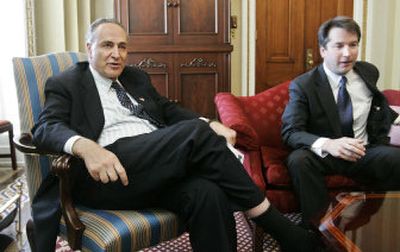D.C.’s ‘Gang of 14’ rides again

WASHINGTON – Nearly a year ago, a bipartisan group of 14 senators pulled the Senate back from the brink of a legislative meltdown over judicial nominees. Today, they’ll gather again to see if their old magic can keep the Senate from imploding again.
Two of President Bush’s nominees for appellate court seats are back on the Senate’s agenda. The two – Brett Kavanaugh and Terrence Boyle – face stiff Democratic opposition.
Enter the “Gang of 14,” seven Democrats and seven Republicans who averted a Senate confrontation last year with a pact that effectively prevented judicial nomination blockades except in “extraordinary circumstances.”
Conservative activists are itching for a partisan face-off over Kavanaugh and Boyle, hoping to invigorate the party’s demoralized core voters before this year’s congressional elections.
But senators and legislative officials from both parties say the confrontation may not materialize.
Kavanaugh, an aide to Bush who was nominated to the U.S. Court of Appeals for the District of Columbia, faces widespread Democratic opposition, but it’s not intense enough to sustain a filibuster, the parliamentary maneuver that allows a minority of senators to block a vote. That means he likely would be confirmed by the Republican-controlled Senate.
Boyle, nominated to the 4th Circuit Court of Appeals in Richmond, Va., would be more likely to spark a Democratic filibuster. But questions about his ethics have raised concerns among Republicans as well, and Senate Majority Leader Bill Frist, R-Tenn., shows no enthusiasm for bringing his nomination to a vote. His nomination may be abandoned.
Kavanaugh, first nominated two years ago, suffered a setback this week when the American Bar Association announced that it had lowered his rating as a judicial nominee from “well qualified” to “qualified.”
Senate Judiciary Committee Chairman Arlen Specter, R-Pa., held a rare second confirmation hearing for Kavanaugh on Tuesday. The 41-year-old lawyer faced tough questions from Democrats about his lack of courtroom experience, his views on the impeachment of President Clinton, his role in selecting past judicial nominees and his views on White House policies on torture.
He said he had played no role in shaping administration policies on detainees and repudiated a now-discredited internal White House memo that endorsed certain forms of torture.
“I don’t believe the analysis of that memo was correct; I don’t think that memo served the president or the presidency well,” he said.
Kavanaugh’s background as a former aide to Whitewater independent counsel Kenneth Starr and as a member of Bush’s inner legal circle since the 2000 election recount led Democrats to criticize him as too partisan.
“Your experience has been most notable not so much for your blue-chip credentials, but for the undeniable political nature of your assignments,” said Sen. Charles Schumer, D-N.Y. “It feeds an impression of partisanship that is, to put it mildly, not ideal for a nominee to a critically important lifetime post.”
Senate Minority Leader Harry Reid, D-Nev., said he hasn’t decided whether to block Kavanaugh, but Sen. Ben Nelson, D-Neb., a leader of the Gang of 14, said that even the lower ABA rating shouldn’t sink his confirmation.
Boyle may never get a Senate vote. A federal district judge, Boyle has been reversed by higher courts 165 times, an usually high number. He also has been damaged by allegations that he had a financial interest in one party to a case he ruled on.